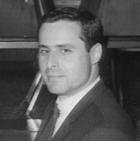Peter Buxtun
Peter Buxtun | |
|---|---|
 An undated photo of Buxtun | |
| Born | Peter Jan Buxbaum September 29, 1937 |
| Died | May 18, 2024 (aged 86) Rocklin, California, U.S. |
| Nationality | American |
| Occupation(s) | Epidemiologist, social worker |
| Known for | Whistleblowing on the Tuskegee Syphilis Study |
Peter Buxtun (sometimes referred to as Peter Buxton; September 29, 1937 – May 18, 2024) was an American epidemiologist.[1] He was an employee of the United States Public Health Service who became known as the whistleblower responsible for ending the Tuskegee Syphilis Study.
Career
[edit]Buxtun, then a 27-year-old social worker and epidemiologist in San Francisco,[2] was hired by the Public Health Service in December 1965[3] to interview patients with sexually transmitted diseases. In the course of his duties, he learned of the Tuskegee Experiment from co-workers. He later said, "I didn't want to believe it. This was the Public Health Service. We didn't do things like that."[2] In November 1966, he filed an official protest on ethical grounds with the Service's Division of Venereal Diseases; this was rejected on the grounds that the experiment was not yet complete. He filed another protest in November 1968, seven months after the assassination of Martin Luther King Jr., pointing out the political volatility of the study; again, his concerns were ruled irrelevant.[4][5]
In 1972, Buxtun leaked information on the Tuskegee experiment to Jean Heller of the Associated Press. It first appeared in the Washington Star. Heller's story exposing the experiment was published on July 25, 1972;[6] It became front-page news in The New York Times the following day. Senator Ted Kennedy called Congressional hearings, at which Buxtun and officials from the U.S. Department of Health, Education, and Welfare testified. The experiment was terminated shortly afterwards.[7] In 1997, President Bill Clinton invited surviving Tuskegee study subjects to the White House, where he offered a formal apology and described the government’s actions over four decades as “shameful” and “clearly racist.”[8]
In May 1999, Buxtun attended the launch of a memorial center and public exhibit to the experiment in Tuskegee, Alabama.[9] On November 4, 2019, Buxtun was inducted as an honorary member of Delta Omega, the honorary society in public health.[10]
Personal life
[edit]Buxtun was born in 1937 in Prague.[11] He was of Jewish and Czech descent.[12] With the rise of Adolf Hitler and Nazism, Buxbaum and family moved to the United States in 1938. They settled on a farm in Oregon's Willamette Valley.[8]
Peter graduated from the University of Oregon with a degree in European history and served as a medic in the U.S. Army.[8] He graduated from UC Law San Francisco in 1971.
Buxtun died from Alzheimer's disease in Rocklin, California, on May 18, 2024, at the age of 86.[13][14]
References
[edit]- ^ Gabriel, Trip (July 18, 2024). "Peter Buxtun, Who Exposed Tuskegee Syphilis Study, Dies at 86". The New York Times. ISSN 0362-4331. Archived from the original on July 22, 2024. Retrieved July 22, 2024.
- ^ a b Heller, Jean (July 20, 1997). "The legacy of Tuskegee". St. Petersburg Times. p. 1D.
- ^ Rubin, Allen; Babbie, Earl R. (2005). Research Methods for Social Work. Thomson Wadsworth. p. 70. ISBN 978-0-534-62109-4.
- ^ Elliott, Carl (December 4, 2017). "Tuskegee Truth Teller". The American Scholar. Archived from the original on April 25, 2020. Retrieved February 27, 2020.
- ^ Thomas, Stephen B.; Quinn, Sandra Crouse (November 1991). "The Tuskegee Syphilis Study, 1932 to 1972: Implications for HIV Education and AIDS Risk Education Programs in the Black Community" (PDF). American Journal of Public Health. 81 (11). American Public Health Association: 1498–1505. doi:10.2105/AJPH.81.11.1498. ISSN 1541-0048. PMC 1405662. PMID 1951814. Archived from the original (PDF) on July 1, 2007. Retrieved March 6, 2008.
- ^ "Archived copy". Archived from the original on August 21, 2024. Retrieved July 16, 2024.
{{cite news}}: CS1 maint: archived copy as title (link) - ^ Stryker, Jeff (April 13, 1997). "Tuskegee's long arm still touches a nerve". The New York Times. p. 4.
- ^ a b c Gabriel, Trip (July 18, 2024). "Peter Buxtun, Who Exposed Tuskegee Syphilis Study, Dies at 86". The New York Times. ISSN 0362-4331. Archived from the original on July 22, 2024. Retrieved August 1, 2024.
- ^ "Center launched as training tool". Associated Press. May 17, 1999.
- ^ "Honorary Members". DeltaOmega.org. Archived from the original on July 26, 2020. Retrieved July 26, 2020.
- ^ Granberg, Donald; Galliher, John F. (2010). A Most Human Enterprise: Controversies in the Social Sciences. Lanham, MD: Lexington Books. p. 3.
- ^ Bush, Lawrence (July 28, 2015). "July 29: The Tuskegee Syphilis Experiment". Jewish Currents. Archived from the original on November 7, 2018. Retrieved November 7, 2018.
- ^ "Tuskegee syphilis study whistleblower dies at age 86". PBS News. Associated Press. July 15, 2024. Retrieved July 15, 2024.
- ^ "Whistleblower helped end the Tuskegee syphilis study". Washington Post. July 16, 2024. Archived from the original on July 18, 2024. Retrieved July 18, 2024.
Further reading
[edit]- Breed, Allen G. (July 31, 2022). "How an AP Reporter Broke the Tuskegee Syphilis Story". Sun Sentinel. Fort Lauderdale, Florida. Section 2, page 8. Archived from the original on July 25, 2022.
- Reverby, Susan (2009). Examining Tuskegee: The Infamous Syphilis Study and Its Legacy. Chapel Hill, NC: The University of North Carolina Press. ISBN 978-0-8078-3310-0. OCLC 319855793.
- 1937 births
- 2024 deaths
- 20th-century United States government officials
- American epidemiologists
- American people of Czech-Jewish descent
- American social workers
- American whistleblowers
- Czech emigrants to the United States
- Czech epidemiologists
- Human subject research in the United States
- People from Prague
- United States Public Health Service personnel
